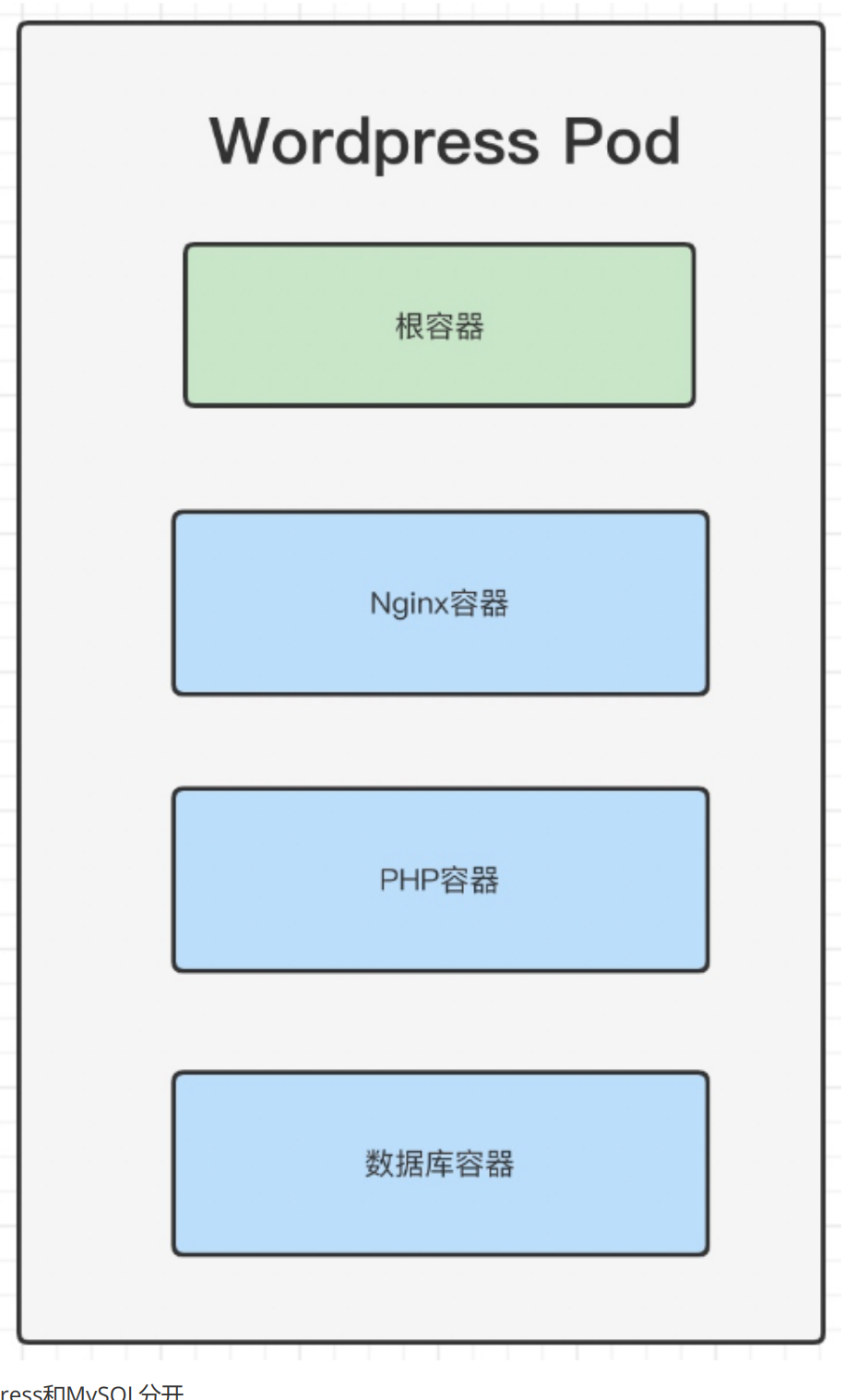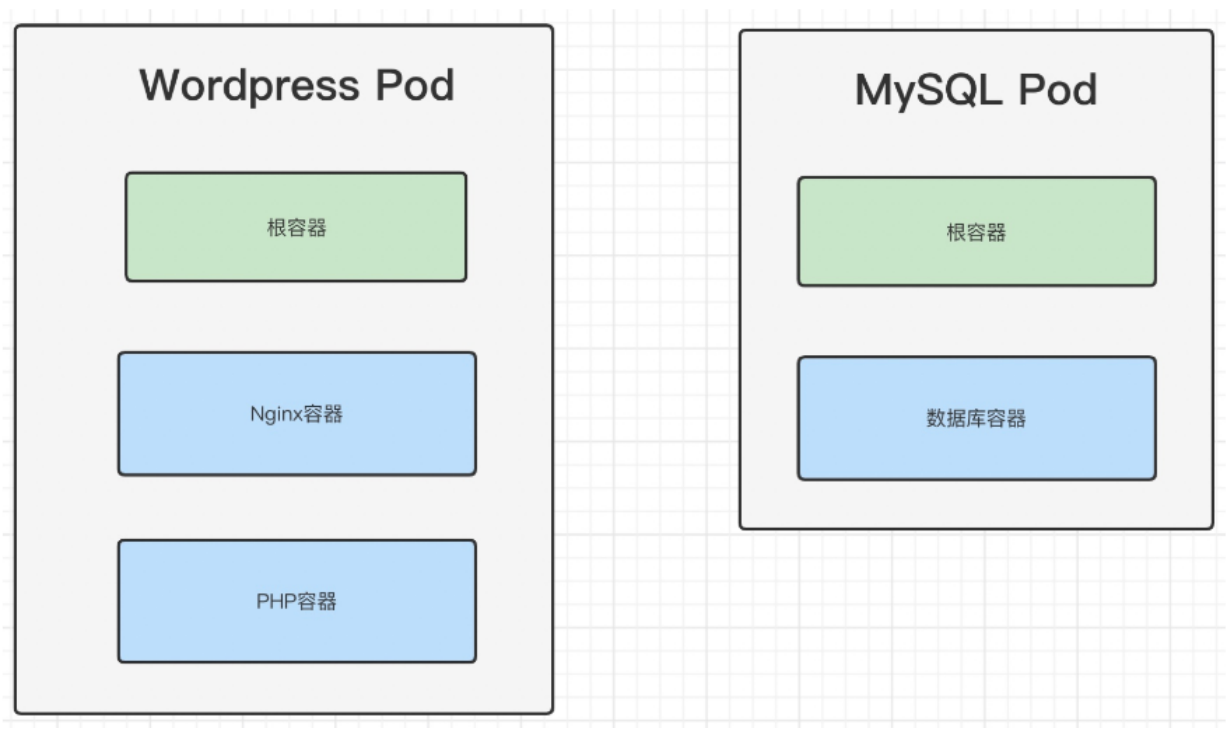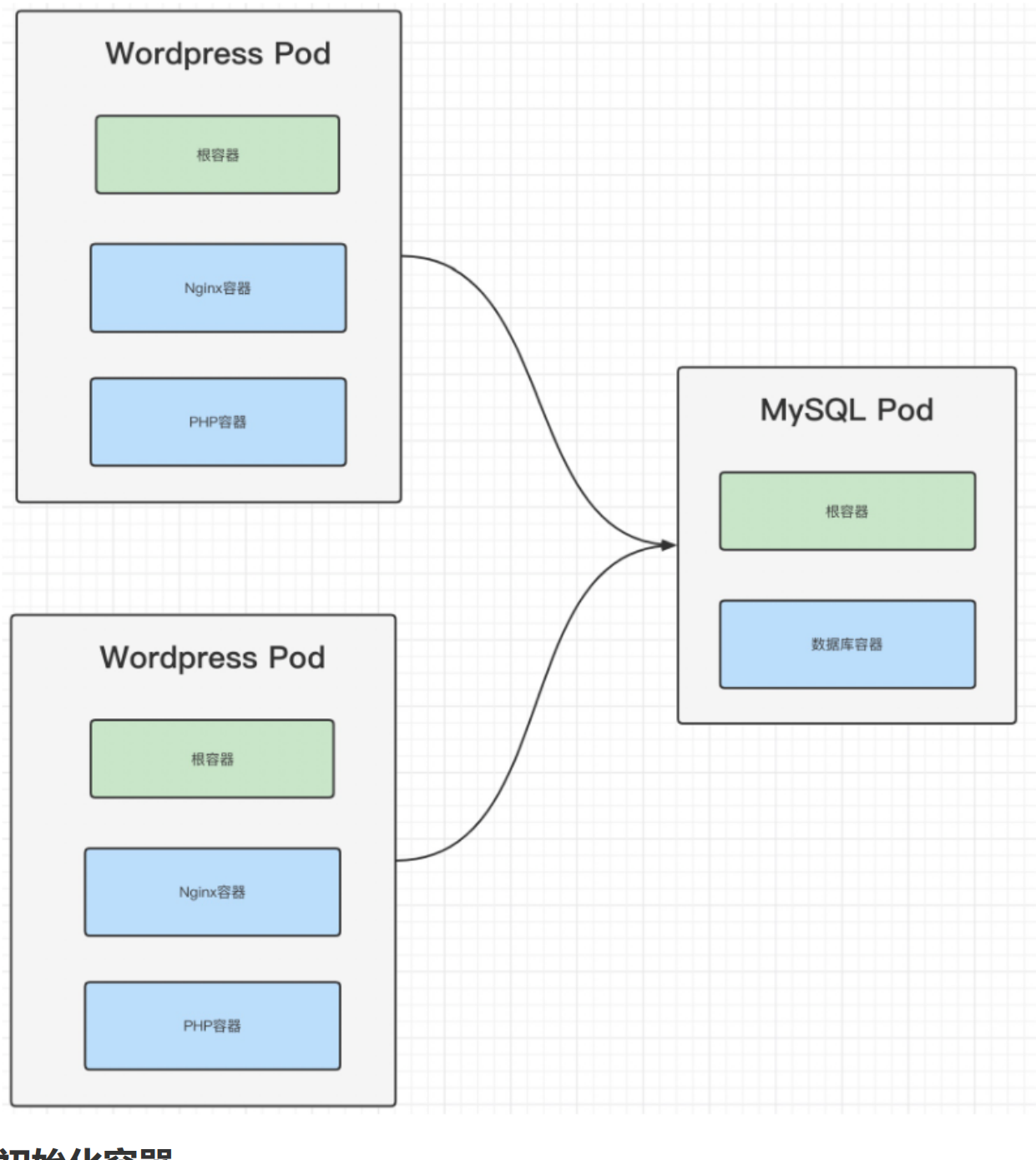POD的生命周期
POD的生命周期
# 删除所有的pod
[root@k8s-m01 ~]# kubectl delete pod --all
## init container
初始化容器是指,在主容器启动之前,我们可以让他做一些准备工作。
比如:
1.两个容器做了共享存储,那么我们可以让它先启动一个容器,来对目录进行更改用户和授权
2.容器需要连接数据,那么可以让初始化容器检测数据库是否可以正常连接,如果可以再启动主容器
## hook
PostStart:在容器启动创建后,立即执行,但时间不能太长,否则容器不会是running状态
PreStop:在容器停止前,执行一些命令,主要用于优雅关闭程序
## liveness probe
存活探针,用于定义容器内,应用是否满足探针指定状态
## readiness probe
就绪探针,指定何时允许容器进入流量
Pod对容器的封装和应用
那么我们在工作中,一个pod究竟要放几个容器?
在实际工作中我们除了完成任务以外还需要考虑以后扩容的问题,就拿wordpress举例,有以下两种方案:
第一种:全部放一个pod里

第二种:Wordpress和MySQL分开

那么如何扩容呢?如果第一种方案大家会发现没有办法很好的扩容,因为数据库和wordpress已经绑定成一个整体了,扩容wordpress就得扩容mysql。而第二种方案就要灵活的多。

初始化容器
apiVersion: "v1"
kind: "Pod"
metadata:
labels:
app: nginx-init
name: nginx-init-v1
spec:
volumes:
- name: code
emptyDir: {}
initContainers:
- name: init
args: ["/bin/sh", "-c", "echo k8s >> /usr/share/nginx/html/index.html"]
image: busybox
imagePullPolicy: IfNotPresent
volumeMounts:
- name: code
mountPath: /usr/share/nginx/html/
containers:
- name: nginx01
image: nginx:alpine
imagePullPolicy: IfNotPresent
volumeMounts:
- name: code
mountPath: /usr/share/nginx/html/
[root@k8s-m01 ~]# kubectl apply -f init.nginx.yaml
[root@k8s-n01 ~]# cat /var/lib/kubelet/pods/2c2f21d6-d1c5-4b95-b7e3-44e6a0e877ba/volumes/kubernetes.io~empty-dir/code/index.html
k8s
hook
# 启动之后钩子和停止钩子
[root@k8s-m01 ~]# kubectl apply -f hook-nginx.yaml
apiVersion: "v1"
kind: "Pod"
metadata:
labels:
app: nginx-hook
name: nginx-hook-v1
spec:
volumes:
- name: code
hostPath:
path: /tmp/html
containers:
- name: nginx01
image: nginx:alpine
imagePullPolicy: IfNotPresent
lifecycle:
postStart:
exec:
command: ["/bin/sh", "-c", "echo postStart >> /usr/share/nginx/html/index.html"]
preStop:
exec:
command: ["/bin/sh", "-c", "echo bye >> /usr/share/nginx/html/1.html"]
volumeMounts:
- name: code
mountPath: /usr/share/nginx/html/
[root@k8s-n02 ~]# cat /tmp/html/index.html
postStart
[root@k8s-n02 ~]# cat /tmp/html/1.html
bye
存活性探针
[root@elkstack01 ~]# vim liveness-nginx.yaml
apiVersion: "v1"
kind: "Pod"
metadata:
labels:
app: nginx-liveness
name: nginx-liveness-v1
spec:
volumes:
- name: code
hostPath:
path: /tmp/html
containers:
- name: nginx01
image: nginx:alpine
imagePullPolicy: IfNotPresent
lifecycle:
postStart:
exec:
command: ["/bin/sh", "-c", "echo livenessProbe >> /usr/share/nginx/html/index.html"]
livenessProbe:
exec:
command: ["/bin/sh", "-c" ,"cat /usr/share/nginx/html/index.html"]
initialDelaySeconds: 3
periodSeconds: 1
volumeMounts:
- name: code
mountPath: /usr/share/nginx/html/
initialDelaySeconds: 3 // 容器启动之后,等待N秒执行探针指定的命令
periodSeconds: 1 // 探针执行的间隔时间,默认10s,最小为1s
## 使用httpGet的方式检测网站是否可以正常访问
[root@elkstack01 ~]# cat liveness-nginx.yaml
apiVersion: "v1"
kind: "Pod"
metadata:
labels:
app: nginx-liveness
name: nginx-liveness-v2
spec:
volumes:
- name: code
hostPath:
path: /tmp/html
containers:
- name: nginx01
image: nginx:alpine
imagePullPolicy: IfNotPresent
lifecycle:
postStart:
exec:
command: ["/bin/sh", "-c", "echo livenessProbe httpGet > /usr/share/nginx/html/index.html"]
livenessProbe:
exec:
#command: ["/bin/sh", "-c" ,"cat /usr/share/nginx/html/index.html"]
httpGet:
path: /index.html
port: 80
initialDelaySeconds: 3
periodSeconds: 1
volumeMounts:
- name: code
mountPath: /usr/share/nginx/html/
就绪态探针
apiVersion: v1
kind: Pod
metadata:
name: readness-nginx
spec:
containers:
- name: readness-nginx
image: nginx:alpine
lifecycle:
postStart:
exec:
command: ["/bin/sh", "-c", "echo ok > /usr/share/nginx/html/health.html"]
readinessProbe:
httpGet:
path: /zls
port: 8080
initialDelaySeconds: 5
timeoutSeconds: 3
periodSeconds: 3
successThreshold: 3
failureThreshold: 3
livenessProbe:
httpGet:
path: /health.html
port: 80
initialDelaySeconds: 3
periodSeconds: 3
initialDelaySeconds: 5 // 容器启动后,等待几秒,执行就绪探针的指令
timeoutSeconds: 3 // 就绪探针执行的超时时间
periodSeconds: 3 // 每个N秒,执行一次就绪态探针指令,默认10s,最小1s
successThreshold: 3 // 如果3次成功,才放行流量
failureThreshold: 3 // 如果3次失败,就彻底失败,一直不放行流量
有时候,应用会暂时性地无法为请求提供服务。 例如,应用在启动时可能需要加载大量的数据或配置文件,或是启动后要依赖等待外部服务。 在这种情况下,既不想杀死应用,也不想给它发送请求。 Kubernetes 提供了就绪探针来发现并缓解这些情况。 容器所在 Pod 上报还未就绪的信息,并且不接受通过 Kubernetes Service 的流量





【推荐】国内首个AI IDE,深度理解中文开发场景,立即下载体验Trae
【推荐】编程新体验,更懂你的AI,立即体验豆包MarsCode编程助手
【推荐】抖音旗下AI助手豆包,你的智能百科全书,全免费不限次数
【推荐】轻量又高性能的 SSH 工具 IShell:AI 加持,快人一步
· Manus爆火,是硬核还是营销?
· 终于写完轮子一部分:tcp代理 了,记录一下
· 别再用vector<bool>了!Google高级工程师:这可能是STL最大的设计失误
· 单元测试从入门到精通
· 震惊!C++程序真的从main开始吗?99%的程序员都答错了